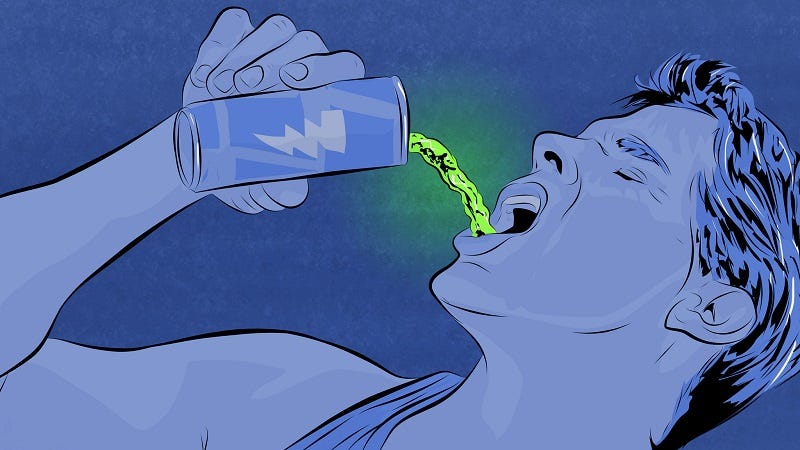Beware Excessive Caffeine
"Caffeine is known at high doses to cause seizures but, whether it can cause seizures in those with lower seizure thresholds in certain conditions is not well established."
Health Canada expert report
"Not recommended for children, pregnant or breastfeeding women, caffeine sensitive persons or to be mixed with alcohol."
"Two cans maximum daily."
Red Bull energy drink label notice
"Caffeine is the major ingredient in most energy drinks—a 24-oz energy drink may contain as much as 500 mg of caffeine (similar to that in four or five cups of coffee). Energy drinks also may contain guarana (another source of caffeine sometimes called Brazilian cocoa), sugars, taurine, ginseng, B vitamins, glucuronolactone, yohimbe, carnitine, and bitter orange."
"Consuming energy drinks also increases important safety concerns. Between 2007 and 2011, the overall number of energy-drink related visits to emergency departments doubled, with the most significant increase (279 percent) in people aged 40 and older. A growing trend among young adults and teens is mixing energy drinks with alcohol." "About 25 percent of college students consume alcohol with energy drinks, and they binge-drink significantly more often than students who don’t mix them. In 2011, 42 percent of all energy-drink related emergency department visits involved combining these beverages with alcohol or drugs (including illicit drugs, like marijuana, as well as central nervous system stimulants, like Ritalin or Adderall)."
U.S. Department of Health and Human Services/National Institutes of Health
 |
| Men'sFitness |
A few weeks back, a 26-year-old man in Ottawa, who has consumed energy drinks for the past decade suddenly, while at work in a food warehouse, collapsed seemingly without reason. He collapsed into a state of seizures, leading other workers standing nearby to rush to his aid. An ambulance was called and he was taken quickly to hospital, where in an unconscious state, he was intubated. He remained unconscious for four days, before finally waking up. His recovery comes complete with nightmares, and anxiety.
According to his family health history, there has never been anyone, including the young man, who suffered from a seizure-prone medical condition such as epilepsy. While in hospital, he was given a number of tests, from an MRI, a CAT scan, spinal tap, a series of blood tests, with none of the results rendering any conclusive hint as to what had activated the young man's collapse. Doctors, however, had their suspicions after having been informed that he normally drinks up to three energy drinks daily.
Authorities representing health agencies around the world, from as far afield as the World Health Organization, to Health Canada, and down to Ottawa Public Health all have questioned how safe energy drinks are, concerned with the high-caffeine drinks causing adverse health effects in those using them, particularly young people. A Scarborough, Ontario man had recently given a presentation to the Ottawa Board of Health ventilating his suspicion that the death of his 15-year-old son from sudden cardiac arrhythmia in 2008 involved energy drinks.
Health Canada had been the recipient of 75 "adverse-reaction reports" up to October of 2013, involving high-caffeine drinks. Half of those reports were in the category of extremely serious, some of those events having resulted in three deaths. An expert panel concluded that caffeine in high doses has been known to cause delirium, neuromuscular tremors, convulsions and vomiting. Caffeine affects heart rate and blood pressure, even when taken in what can be considered to be moderate doses.
The end result was that the panel made a recommendation that energy drinks be used only by adults with a maximum dose per unit of 80 mgs of caffeine. A small Red Bull energy drink can of 250 mL contains 80 mgs of caffeine. In recognition of an obligation as a responsible food producer, the company carries a notice of caution for the use of its product. It also notes that a can of the product contains a similar amount of caffeine as a single cup of coffee.
Health authorities feel that the product is safe as long as users pay attention to the cautions. However, it is an extremely popular drink among young people, who are not known for caution, and there lies a problem; the public tends to view food and drink as 'safe', and rarely questions ingredients.
A follow-up by an investigative reporter with a local newspaper found that a 473 mL can of Rockstar contains 160 mgs of caffeine with a recommendation of one unit to be consumed on a daily basis. For the Monster brand energy drink 166 mgs of caffeine reflects the product and it too offers the same caution for consumption.
The Ottawa public health department plans to embark on a public consultation on the marketing of energy drinks, among other processed high-fat and high-sugar foods, to be restricted in schools. "The regular consumption of sugar-sweetened beverages, including energy drinks, is not conducive to a healthy diet", according to a staff report.
Every parent knows what a young person's reaction is to such cautions; it generally excites interest in a forbidden fruit that suddenly becomes attractive, contrary to the purpose of the wording of the caution, but completely consistent with the reverse psychology that engages a child's mind when an adult intervenes in any issue.
 |
| Lifehacker |
Labels: Caffeine, Conspicuous Consumption, Energy, Health

0 Comments:
Post a Comment
<< Home